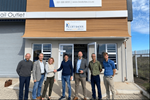GFRP Tech launches South African facility for GFRP rebar production
Said to be the first of its kind in this region, GFRP Tech will manufacture, test and supply flagship EnviraBar and EnviraMesh products to support South Africa’s infrastructure modernization.
GFRP Tech (Johannesburg, South Africa), a manufacturer and supplier of glass fiber-reinforced polymer (GFRP) products, has launched what is says is the first manufacturing facility of its kind in South Africa. The facility, situated in Linbro Park, Gauteng, will manufacture GFRP rebar, GFRP mesh and GFRP bends. In addition, the multi-million rand facility has been designed to manufacture, test and supply GFRP Tech’s flagship EnviraBar and EnviraMesh alternatives to traditional steel rebar.
GFRP Tech’s manufacturing facility has been through stringent international testing and audited by a team of experts from the FRP Institute in the U.S. The company’s first order was manufactured and delivered to a construction project in Bedfordview, close to Johannesburg in September 2024.
“This is a significant investment in the local manufacturing sector, which is pivotal to growing the South African economy,” notes GFRP Tech director Allen Fiford. “By establishing the GFRP Tech facility, we are localizing the manufacturing of GFRP rebar, dramatically reducing supply chain lead times. We are not only changing the face of the country’s construction industry, but creating substantial jobs and further opportunities for growth.”
Fiford explains that there was a pressing need in the South African construction sector for structural reinforcement solutions that were not only stronger and more durable than traditional steel rebar with improved ductility, but also more environment friendly. “These products are 75% lighter and three times stronger than steel, resistant to corrosion and designed to last,” says Fiford.
With these properties, Fiford adds, products like EnviraBar and EnviraMesh are ideal for applications in harsher environments. “Besides these benefits, our GFRP products further enhances structural integrity, while reducing the risk of concrete cancer,” noting that concrete cancer is caused when the steel reinforcing within a concrete slab begins to rust. “As the steel rusts, it expands and displaces the surrounding concrete causing it to become brittle and crack, which is hazardous.”
Strategically placed close to nationwide logistic routes, GFRP Tech believes that manufacturing locally enables prompt delivery and responsive service. “We are supporting the economy, delivering exceptional products throughout South Africa and across the African region and cutting on turnaround times for construction projects,” says Fiford.
The audited and certified South African facility is set to produce substantial volumes of EnviraBar and EnviraMesh per day, with rebar measuring from 4-32 millimeters in diameter and any length required. “Not only are we realizing energy savings during production, but we are also cutting down on costs during transportation and installation,” says GFRP Tech director of sales and marketing, Gareth Roberts. “Less fuel consumption during transportation further contributes to lower carbon emissions, making GFRP Tech’s products a more energy-efficient option during the construction phase.”
“Our country has ambitious plans to modernize our infrastructure by investing in the expansion of ports, rail and road networks. GFRP Tech will be there to support this growth,” concludes Fiford.
Related Content
-
Fiberglass conduit manufacturer grows into new products, infrastructure applications
Texas-based Champion Fiberglass, a five-time CW Top Shops honoree, expands its success in the fiberglass composite conduit market into new applications and products, looking toward future automation and sustainability initiatives.
-
Plant tour: BeSpline/Addcomp, Sherbrooke, QC, Canada
Composites automation specialist increases access to next-gen technologies, including novel AFP systems and unique 3D parts using adaptive molds.
-
Swedish parking garage to incorporate decommissioned wind blades
Architect Jonas Lloyd is working with Vattenfall to design the multistory building with a wind blade façade, targeting eco-friendly buildings and creative ways to remove blades from landfills.

















